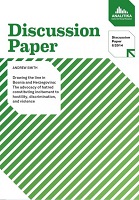Drawing The Line in Bosnia and Herzegovina: The Advocacy of Hatred Constituting Incitement to Hostility, Discrimination, and Violence
Drawing The Line in Bosnia and Herzegovina: The Advocacy of Hatred Constituting Incitement to Hostility, Discrimination, and Violence
Author(s): Andrew Smith
Contributor(s): Edin Hodžić (Editor), Amra Mehmedić (Editor), Sanela Hrlović (Editor)
Subject(s): Criminal Law, Civil Law, International Law, Human Rights and Humanitarian Law, Court case
Published by: Analitika – Centar za društvena istraživanja
Keywords: BiH; hate speech; hate crimes; discrimination; violence; incitement;
Summary/Abstract: In this paper, ARTICLE 19 assesses the extent to which the criminal legal framework within Bosnia and Herzegovina (BiH) complies with its obligations under the International Covenant on Civil and Political Rights to protect and promote the right to freedom of expression while prohibiting the “advocacy of national, racial or religious hatred that constitutes incitement to discrimination, hostility or violence” (“incitement” or “the advocacy of hatred that constitutes incitement”). Prohibitions on incitement in each of the four BiH criminal codes are poorly formulated and conflate a number of distinct issues. Key components of incitement, such as the need for “advocacy of hatred”, are overlooked and not included as essential elements of criminal offences. One consequence of this the blurring of the line between expression that should be prohibited and other forms of protected speech, including the right to offend others or denigrate national symbols and objects. At the same time, incitement is conflated with other forms of bias-motivated crimes, such as torture or property damage. Despite national, ethnic and religious tensions within BiH remaining very high, criminal prohibitions on incitement have not been enforced to sanction the most harmful forms of expression in the country. Absent specific provision for recognising bias-motivation in the commission of any criminal offence (prior to 2010 bias motivation was only recognised within a limited category of offences under each code), the incitement provisions have instead been used to prosecute bias motivated crimes where there was no advocacy of hatred or expression central to the case. Since reforms to the criminal codes in 2010 have provided alternative provisions for prosecutors to punish a broader range of bias-motivated crimes that are not incitement, there is now a strong case for reforming the incitement provisions so that they specifically address the most severe forms of harmful expression, while according adequate protection to fundamental rights. The analysis arrives at a series of recommendations to reform the criminal codes in BiH so that they comply international standards. We encourage all relevant stakeholders to initiate a national debate on this issue, and for any reforms to be treated as an opportunity for not only reshaping the criminal law but assessing where alternative prohibitions and positive policy measures may more effectively promote tolerance and protect the right to freedom of expression.
Series: Analitika - Discussion Paper
- Page Count: 30
- Publication Year: 2014
- Language: English
- Content File-PDF
- Introduction

